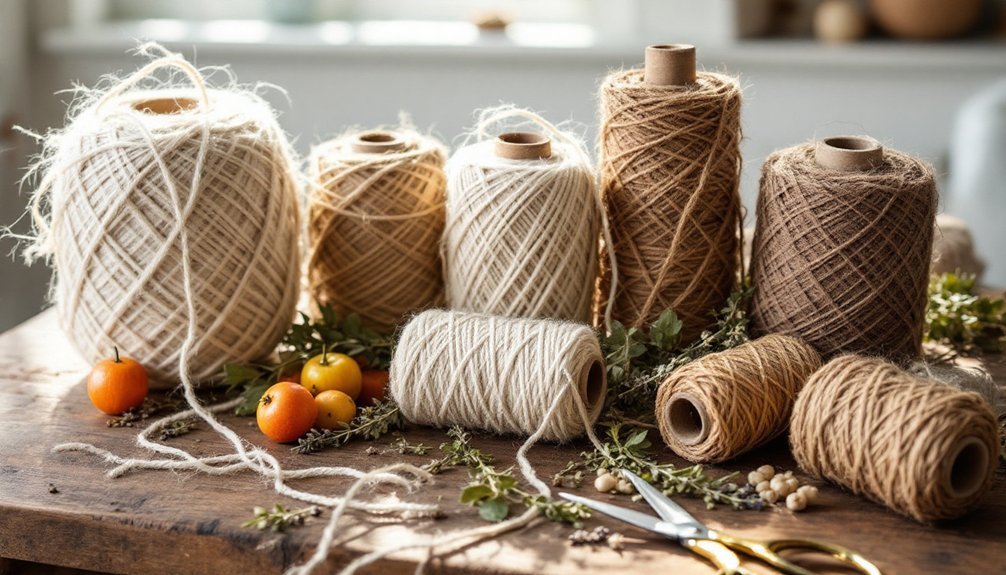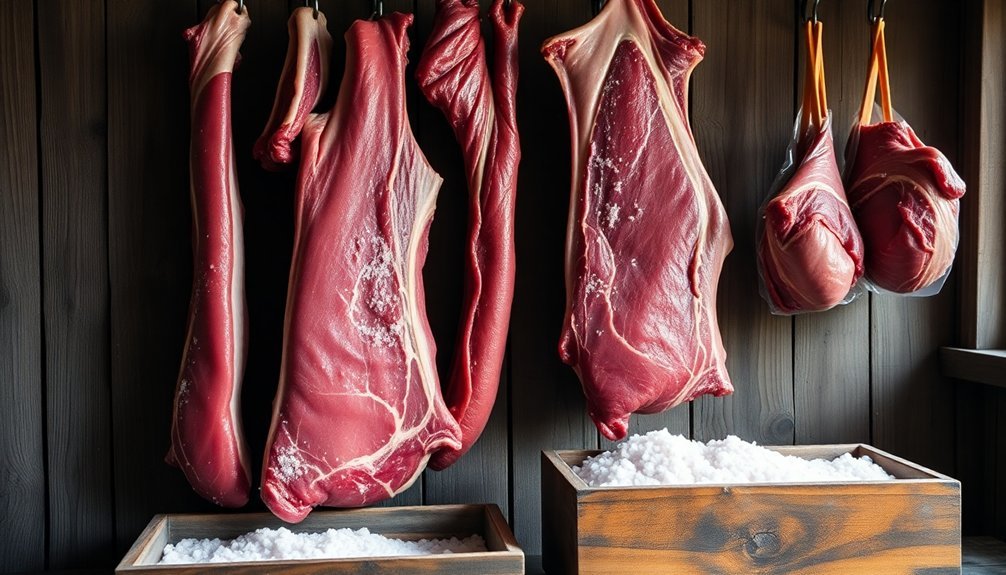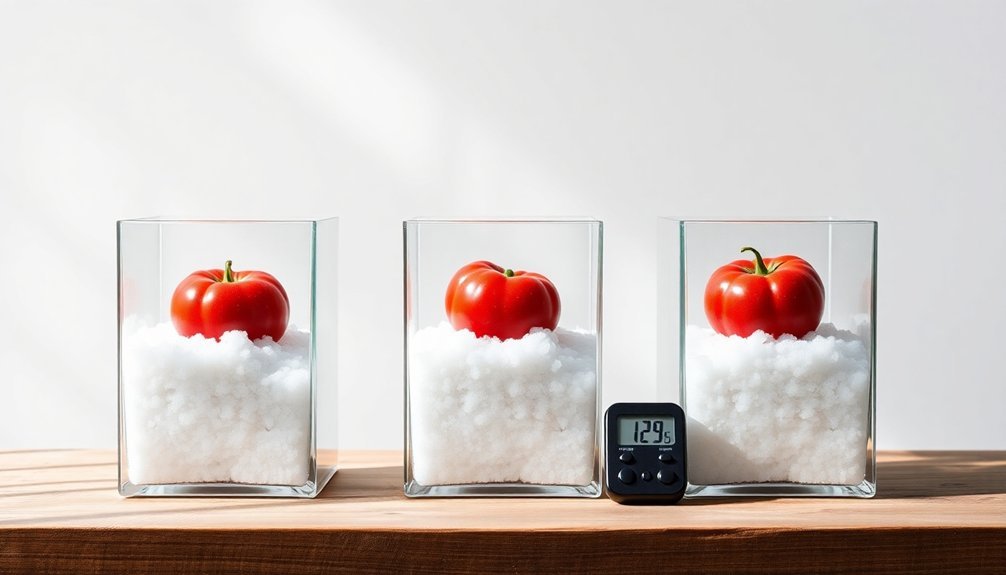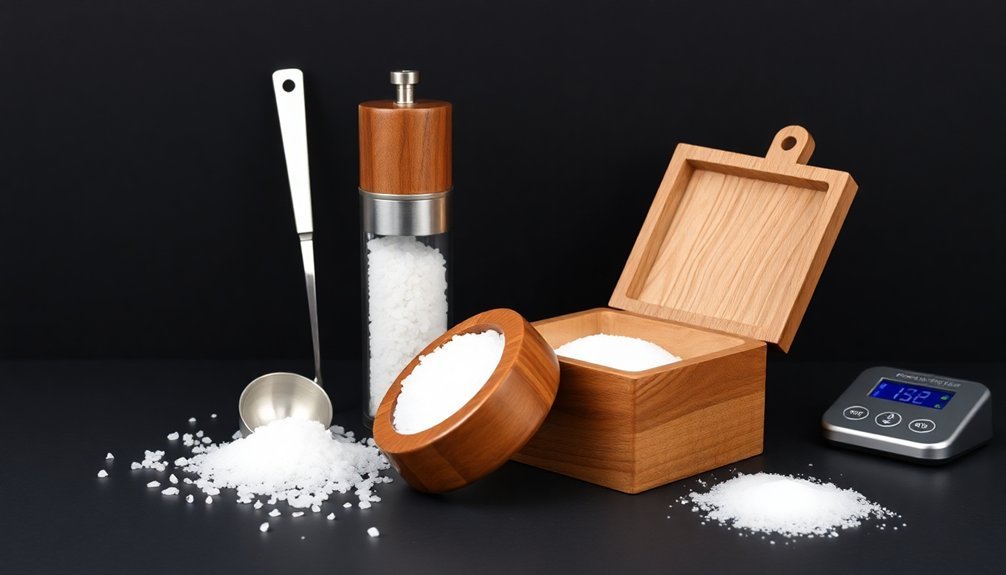Looking to dry your own foods but unsure which twine will keep everything securely hanging? You're not alone. With the growing interest in food preservation, choosing the right natural twine has become essential for success. From cotton to jute, each material offers distinct advantages for different drying needs. We'll guide you through the top seven natural twines of 2025, helping you make an informed choice that'll guarantee your food stays safely suspended throughout the drying process.
Anvin Cotton and Jute Twine, 984 Feet (Pack of 3)
The Anvin Cotton and Jute Twine set stands out as an essential kitchen companion for home chefs and DIY enthusiasts who need versatile, food-safe twine. You'll get three 328-foot rolls – black, white, and jute – each featuring 2mm-thick, 10-ply construction that won't break under pressure.
The convenient coil packaging prevents tangling, making it easy to use whether you're trussing turkeys, wrapping gifts, or tackling craft projects. While the black and white cotton twines perform excellently with food, you'll want to avoid using red varieties that may bleed. The manufacturer backs their product with a one-year warranty, ensuring you're covered if any quality issues arise.
Best For: Home cooks, crafters, and DIY enthusiasts looking for versatile, durable twine for both food preparation and decorative projects.
Pros:
- High-quality construction with 10-ply, 2mm thickness provides excellent durability
- Convenient three-color pack with 328 feet per roll offers great value for money
- Tangle-free coil packaging makes storage and usage hassle-free
Cons:
- Red twine variants have issues with color bleeding (not included in this pack)
- Limited color selection compared to some competing products
- Cotton twine may shrink slightly when wet or exposed to moisture
Thick Natural Jute Rope (328 Feet, 6mm)
Strong and versatile, ILIKEEC's natural jute rope offers an eco-friendly solution for food drying projects, while its 6mm thickness provides ideal durability for heavy produce.
At 328 feet long, you'll have plenty of rope for multiple drying lines. The 4-ply construction guarantees strength and stability, while the natural jute material's anti-corrosion properties make it perfect for humid environments. You won't need to worry about mold or deterioration affecting your dried foods.
The rope's biodegradable nature means you're making an environmentally conscious choice without sacrificing quality. Its stretch-resistant characteristics prevent sagging, keeping your food items properly spaced during the drying process.
Best For: DIY enthusiasts and gardeners seeking an eco-friendly, durable rope for crafts, plant support, and general household use.
Pros:
- Long 328-foot length provides excellent value and plenty of material for multiple projects
- Natural jute material is biodegradable and environmentally friendly while remaining strong and durable
- Versatile 6mm thickness works well for various applications from gardening to crafts
Cons:
- Natural fiber may shed slightly during initial handling
- Not suitable for heavy-duty load-bearing applications
- May deteriorate more quickly than synthetic ropes when exposed to constant moisture
5mm Jute Twine Natural Rope (328 Feet)
Natural and versatile, 5mm jute twine offers eco-conscious crafters and gardeners a robust solution for their food-drying needs. You'll find this 328-foot roll perfect for hanging herbs, fruits, and vegetables, thanks to its thick 5mm diameter and superior strength.
The biodegradable jute fiber won't harm your food or the environment, making it an ideal choice for sustainable food preservation. You'll appreciate the built-in cutter and tangle-free packaging, which lets you measure and cut exactly what you need. While it's sturdy enough to support heavy produce, it's also soft enough to tie easily, ensuring your dried goods stay securely fastened throughout the preservation process.
Best For: Home gardeners, crafters, and food preservation enthusiasts looking for a strong, natural, and eco-friendly twine for multiple purposes including drying herbs and securing plants.
Pros:
- Thick 5mm diameter provides excellent strength for heavy-duty applications
- Built-in cutter and tangle-free packaging make it convenient to use
- Biodegradable and eco-friendly material is safe for food contact and environmentally conscious
Cons:
- Natural jute may deteriorate faster than synthetic alternatives when exposed to moisture
- May be too thick for delicate crafting projects requiring finer detail
- Could be more expensive than thinner twine options for basic tying needs
JijAcraft Butchers Twine 656 Feet Cotton String for Kitchen & Cooking
Professional chefs and home cooks seeking a reliable kitchen twine will find jijAcraft's 656-foot cotton string an excellent choice for food preparation tasks. At 2mm diameter, this 100% cotton twine is thin yet strong enough for trussing poultry, forming roasts, and sausage making.
You'll appreciate how the spool stores neatly and dispenses easily when you need to cut precise lengths. While it's oven-safe, you'll want to keep it away from direct flames. For food safety, it's best to use fresh pieces each time. With consistently high ratings from thousands of users, this versatile twine delivers great value for both cooking and crafting needs.
Best For: Home cooks, professional chefs, and craft enthusiasts who need a reliable, food-safe cotton twine for kitchen tasks like trussing poultry and meat preparation, or for general crafting projects.
Pros:
- Long length (656 feet) provides excellent value and ensures ample supply for multiple uses
- 100% cotton material makes it food-safe and oven-safe for cooking applications
- Versatile enough for both cooking and crafting with strong positive customer feedback (4.7/5 stars)
Cons:
- 2mm diameter may be too thin for some heavy-duty applications
- Recommended for single use in cooking, which can make it less economical for frequent cooks
- Must be kept away from direct flames, limiting some high-heat cooking applications
PerkHomy Natural Jute Twine String (600 Feet)
Eco-conscious DIY enthusiasts will appreciate PerkHomy's 600-foot jute twine, combining durability with environmental responsibility. This 2mm-thick natural fiber string resists abrasion and corrosion while remaining biodegradable.
While it's excellent for crafts and gardening, you'll want to avoid using this jute twine for food drying. Unlike cotton butcher's twine, jute isn't food-safe and could transfer unwanted fibers to your dried goods. Instead, use this versatile twine for gift wrapping, plant support, or decorative projects. With over 7,000 positive reviews praising its sturdiness, you'll find countless non-food applications for this reliable Chinese-made twine.
Best For: DIY crafters, gardeners, and eco-conscious consumers looking for a strong, natural twine for non-food decorative projects, gift wrapping, and plant support.
Pros:
- Highly durable and resistant to abrasion, corrosion, and rain
- Eco-friendly and biodegradable, made from 100% natural jute fiber
- Versatile length (600 feet) with strong customer satisfaction (4.7/5 stars)
Cons:
- Not suitable for food-related uses
- May shed fibers during use
- Limited color options (natural jute only)
PerkHomy Cotton Butchers Twine String (500 Feet)
Home chefs and craft enthusiasts will appreciate PerkHomy's 500-foot cotton butcher's twine, a versatile and food-grade string that's earned impressive customer ratings.
This 2mm-thick natural white twine comes from a manufacturer with 13 years of experience. You'll get 150 meters of 100% cotton string that's perfect for trussing poultry, tying roasts, and hanging herbs to dry. The string's soft texture and food-safe material make it ideal for kitchen tasks, while crafters can use it for DIY projects and gift wrapping.
With over 2,300 positive reviews and a 4.7-star rating, customers consistently praise its durability and value.
Best For: Home cooks, crafters, and DIY enthusiasts who need a reliable, food-safe twine for both kitchen use and craft projects.
Pros:
- High-quality, 100% cotton food-grade material safe for cooking and food preparation
- Generous 500-foot length offers excellent value for money
- Versatile applications from cooking to crafting with strong customer satisfaction (4.7/5 stars)
Cons:
- 2mm thickness may be too thick for some delicate crafting projects
- Natural white color only – no color options available
- Takes up more storage space than smaller rolls of twine
Regency Wraps Butchers Cooking Twine (500ft, Food-Safe)
Chefs and culinary enthusiasts seeking reliable food-safe twine will find their match in Regency Wraps Butchers Cooking Twine. This heavy-duty 16-ply cotton twine stretches 500 feet and features a sturdy 2.4mm thickness that won't cut into your meat during preparation.
You'll appreciate its versatility beyond basic trussing – use it for forming roasts, creating soufflé collars, and drying herbs. While it's oven-safe, you'll want to keep it away from direct flames. With a 4.8-star rating from over 38,000 users, this USA-made twine delivers professional-grade quality that's earned the trust of top chefs worldwide since 1985.
Best For: Professional chefs, home cooks, and culinary enthusiasts who need reliable, food-safe twine for meat preparation, trussing poultry, and various kitchen tasks.
Pros:
- Heavy-duty 16-ply cotton construction provides excellent durability and strength
- Versatile application beyond cooking – useful for crafting, gardening, and household tasks
- Outstanding customer satisfaction with 4.8/5 stars from over 38,000 reviews
Cons:
- Single-use recommendation limits reusability and economic value
- Not suitable for use with direct flames
- Relatively large quantity (500ft) may be excessive for casual home cooks
Factors to Consider When Choosing Natural Twine for Hanging Dried Foods
When you're selecting natural twine for hanging dried foods, you'll need to evaluate several critical factors including food-safe materials, adequate strength for your intended load, and reliable knot-holding capabilities. You'll want to reflect on the twine's resistance to moisture and mold growth, as these can compromise both the safety of your food and the durability of your hanging setup. Additionally, if environmental impact matters to you, look for biodegradable options made from sustainable natural fibers that won't harm the ecosystem when disposed of.
Food Safety and Material
Selecting the right natural twine for food drying isn't just about strength – it's crucial to prioritize food safety and material quality.
You'll want to choose 100% cotton or jute twine that's specifically labeled as food-safe and free from harmful chemicals or dyes. Look for products marked as biodegradable and eco-friendly to guarantee they won't contaminate your food or harm the environment. When selecting your twine, consider its diameter – thicker options between 2mm to 6mm provide better support for heavier dried foods.
Since moisture can compromise both the twine's integrity and your food's quality, opt for moisture-resistant varieties. Your best bet is to invest in twine that's designed specifically for culinary use, as these products are treated to withstand heat and are safe for direct food contact.
Strength and Load Capacity
Since the success of your food-drying project depends heavily on proper support, understanding your twine's strength and load capacity is essential. When selecting twine, opt for thicker varieties with a diameter of 4mm or more, as they'll provide superior strength for your dried foods.
You'll want to evaluate the material composition carefully. While both jute and cotton are popular choices, they offer different levels of durability. Choose heavy-duty, multi-stranded twines for heavier items to prevent fraying and breakage. Don't forget that environmental conditions can impact your twine's performance – humidity and temperature fluctuations may weaken natural fibers over time.
Before hanging your full batch, it's smart to test your chosen twine with a small weight. This simple step will help you confirm it can safely support your dried foods.
Knot Holding Properties
Beyond a twine's strength, its ability to hold knots securely determines the success of your food drying setup. You'll want to evaluate thickness first, as thicker twines naturally provide better grip when tied. Cotton twines offer excellent knot-holding properties with their soft yet grippy texture, while rougher biodegradable options like jute create more friction to prevent slippage.
Look for twines with multiple strands twisted together, as they'll give you superior knot retention through increased friction points. When you're examining different options, pay attention to the surface texture – natural twines with a slightly coarse feel typically outperform smoother varieties in keeping knots tight. Remember that knot security directly affects how well your dried foods stay suspended, so don't compromise on this essential feature when making your selection.
Environmental Impact Considerations
Making environmentally conscious choices with your food drying materials starts with understanding the impact of natural twines. When you choose biodegradable options like jute or cotton twine, you're helping reduce the environmental footprint of your food preservation activities.
Natural twines break down completely in soil, unlike synthetic alternatives that can persist for centuries. As they decompose, these materials actually benefit your garden by enriching the soil. You'll also support sustainable farming practices and local economies by selecting twines made from renewable resources. This choice helps prevent deforestation and habitat loss associated with non-renewable materials.
Resistance to Moisture
While natural twines offer environmental benefits, their ability to withstand moisture directly affects their performance in food drying applications. You'll want to select twines that maintain their structural integrity when exposed to humidity during the drying process.
Look for tightly twisted or thicker-diameter twines, as they typically provide better resistance against moisture. Some natural twines come with special treatments or inherent properties that combat mold and mildew growth, which is essential for food safety. When you're using jute or cotton twines, choose varieties specifically designed for food-related use.
To maximize your twine's performance and longevity, store your dried foods in a cool, dry environment. This practice helps prevent moisture from compromising the twine's strength and guarantees your food stays safely suspended throughout the drying process.
Frequently Asked Questions
How Long Can Natural Twine Be Reused for Food Drying Purposes?
You can reuse natural twine for food drying 3-4 times if it's properly cleaned and dried between uses. Replace it when you notice fraying, discoloration, or any signs of mold and mildew.
Can Natural Twines Be Composted After They're No Longer Usable?
Yes, you can compost natural twines once they're worn out. Since they're made from organic materials like cotton, hemp, or jute, they'll break down naturally in your compost bin without leaving harmful residues.
What's the Best Way to Sanitize Natural Twine Between Uses?
You can sanitize your natural twine by boiling it in water for 5-10 minutes, then letting it air dry completely. For extra protection, you can also soak it in a vinegar solution before use.
Does UV Exposure Affect the Durability of Natural Twine Outdoors?
Yes, UV exposure will weaken your natural twine over time. You'll notice it becoming brittle and losing strength when left outdoors. It's best to store your twine in a dark, dry place between uses.
Should Natural Twine Be Pre-Soaked Before Using for Food Drying?
You don't need to pre-soak natural twine for food drying. It's best to use it dry to prevent moisture transfer to your food and avoid potential mold growth during the drying process.
In Summary
You'll find the perfect natural twine for your food drying needs among these seven options. Whether you're looking for durability with Anvin's cotton-jute blend or food safety with Regency's butcher twine, there's a solution that fits your requirements. Remember to evaluate thickness, biodegradability, and moisture resistance when making your choice. These twines won't let you down in your food preservation journey.





Leave a Reply